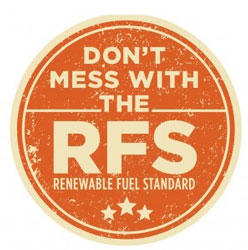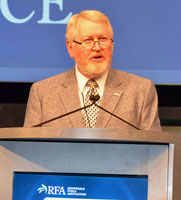 Platts, a leading global provider of energy and commodities information has begun publishing price assessments for a key ethanol byproduct increasingly used as animal feed in the U.S. and globally. The new references are for dried distillers grains with solubles (DDGS) and reflect values for the Midwest, the nation’s key corn, wheat and grains producing region, and exportable values at the U.S. Gulf Coast.
Platts, a leading global provider of energy and commodities information has begun publishing price assessments for a key ethanol byproduct increasingly used as animal feed in the U.S. and globally. The new references are for dried distillers grains with solubles (DDGS) and reflect values for the Midwest, the nation’s key corn, wheat and grains producing region, and exportable values at the U.S. Gulf Coast.- Global Concentrated Photovoltaic (CPV) installed capacity will increase more than fourfold from 282.5 MW in 2014 to reach 1.3 GW by 2020, across the seven major markets of the US, China, South Africa, Australia, Portugal, Italy and Spain, according to research and consulting firm GlobalData. The report states that while China and the US are the largest CPV markets globally, South Africa is expected to make a significant impact on the global arena over the course of the forecast period.
- India submitted its Intended Nationally Determined Contribution (INDC) to the United Nations Framework Convention on Climate Change (UNFCCC), marking a significant milestone in the effort to reach the first, country-led climate deal in Paris this December. India is committing to, among other things: increasing non-fossil fuels in its electrical mix to 40% installed capacity by 2030 with the help of transfer of technology and low cost international finance including from the Green Climate Fund; and adding 175GW of new renewable energy generation by 2022 (of which 100GW will be solar).
- Nearly 30 leading companies and organizations in Michigan today announced the formation of Clean Fuels Michigan. The new 501(c)(6) organization aims to maintain Michigan’s position as a global leader in automotive manufacturing by advancing a clear vision, strategy, and advocacy centered on advanced powertrain technology and innovation. The overall goal is to promote investment, job growth and sustainable technologies in Michigan. Clean Fuel Michigan will advance clean fuel neutral policies, such as electric, natural gas, propane and hydrogen fuel cell technology, advise policy makers, and help commercialization efforts.
EV Connect Launches EV CaaS
EV Connect has launched what they call the first-ever “EV Charging-as-a-Service” or “EV CaaS,” to reduce up-front costs and simplify the process for purchasing and installing EV charging station infrastructure by turning the purchase decision from a capital expenditure to an operating expense. The new program was developed in collaboration with GE and SparkFund.
![]() Each EV charge station comes with GE’s WattStation and DuraStation as well as EV Connect’s base management software and service. Starting at $99 per month per charge station, the EV CaaS, says EV Connect, offers businesses and government entities a full-service resource to assist with financing, deployment and management.
Each EV charge station comes with GE’s WattStation and DuraStation as well as EV Connect’s base management software and service. Starting at $99 per month per charge station, the EV CaaS, says EV Connect, offers businesses and government entities a full-service resource to assist with financing, deployment and management.
“The single biggest hesitation facility owners have when considering EV charging station installation is up-front cost,” said Jordan Ramer, EV Connect President. “The EV CaaS program, in collaboration with SparkFund and GE, offers a pay-as-you-go alternative to capital purchases and greatly simplifies the decision-making process.”
EV Connect says they are the first provider to offer this type of program. In addition to overseeing procurement, permitting and installation, they manage all aspects of the charging station including service, driver support, station management and usage.
“Welcome to a new world of financing for EV charging infrastructure,” added Pier LaFarge, SparkFund Co-founder and CEO. “EV CaaS puts EV charging within reach of any facility by shifting financing from an upfront capital expenditure to a pay-over-time operating expense.”
MSU, ExxonMobil Partner for Algae Biodiesel
 One of the nation’s premier research universities is partnering with one of the biggest oil producers to make renewable, algae-based biodiesel. This news release from Michigan State says the school and ExxonMobil will expand research designed to progress the fundamental science required to advance algae-based fuels.
One of the nation’s premier research universities is partnering with one of the biggest oil producers to make renewable, algae-based biodiesel. This news release from Michigan State says the school and ExxonMobil will expand research designed to progress the fundamental science required to advance algae-based fuels.
David Kramer, MSU’s John Hannah Distinguished Professor in Photosynthesis and Bioenergetics at the MSU-DOE Plant and Research Laboratory, says that the overall goal of the partnership is to improve the efficiency of photosynthesis in microalgae to produce biofuels and bioproducts.
“Photosynthesis is the biological process that plants and algae use to store solar energy in biomass. It is how all our food is made, and we would starve without it,” said Kramer, who is leading the grant with Ben Lucker with the PRL and Joe Weissman, Distinguished Scientific Associate at ExxonMobil.
The key to bioenergy is the efficiency of photosynthesis, the process algae use to capture solar energy and the first step in converting the energy from the sun into a liquid fuel. Past research has shown that algae photosynthesis can be highly efficient under optimal conditions in the laboratory. Under realistic growth conditions however, this efficiency drops. There is a need to improve photosynthesis under simulated production environments.
“Fortunately, nature has provided us with a great potential for improvement. There are many different strains of algae that have adapted to work well in different environments,” Kramer said. “What we want to do is figure out how they are able to do this and what genes are responsible. With this knowledge, we can potentially combine traits to make strains that are more efficient even under harsh conditions.”
“We know certain types of algae produce bio-oils,” said Vijay Swarup, vice president of ExxonMobil Research and Engineering Company. “The challenge is to find and develop algae that can produce bio-oils at scale on a cost-efficient basis.”
Propel’s Renewable Diesel Fuels California
 Propel Fuels brings its high-performance renewable diesel to Hayward, California. This company news release says the fuel is available at Hayward’s “880 Gas” station at 391 West A Street. Propel also took the chance to address the Volkswagen diesel scandal.
Propel Fuels brings its high-performance renewable diesel to Hayward, California. This company news release says the fuel is available at Hayward’s “880 Gas” station at 391 West A Street. Propel also took the chance to address the Volkswagen diesel scandal.
Drivers can easily find the nearest Propel Diesel HPR location and real time pricing by downloading Propel’s mobile app available in the Android and Apple app stores. Sacramento-based Propel has pioneered low-carbon fuel retail in California, leading the industry with unparalleled innovation in retail technology and customer experience. The company’s CleanDrive® platform, the nation’s first integrated emission reduction tracking tool, enables consumers and fleets to quickly see the positive impact made by using low-carbon fuels including Diesel HPR and E85 Flex Fuel.
In light of the recent VW scandal and increased nitrogen oxide (NOx) emissions in affected Volkswagen diesel vehicles, Diesel HPR is a simple and affordable way to reduce emissions and improve local air quality. Diesel HPR reduces harmful air emissions including NOx by 14 percent, particulates by 34 percent, and reduces greenhouse gas (GHG) lifecycle emissions by up to 80 percent when compared to petroleum-based diesel. NOx emissions are directly linked to air quality in California, negatively impacting children, people with lung diseases such as asthma, and people who work or exercise outside.
“We understand that customers are frustrated with the recent news about VW’s diesel emissions. We wanted to remind them they can drive cleaner, with more efficiency and value by fueling with our Diesel HPR at 32 locations across California, now including Hayward,” said Rob Elam, CEO of Propel.
Joule Receives EPA Cert for CO2 Ethanol
 Joule’s fuel grade Sunflow-E ethanol has been registered by the U.S. Environmental Protection Agency (EPA) for commercial use in E10 and E15 gasoline blends. The fuel is derived from recycled CO2.
Joule’s fuel grade Sunflow-E ethanol has been registered by the U.S. Environmental Protection Agency (EPA) for commercial use in E10 and E15 gasoline blends. The fuel is derived from recycled CO2.
“We are approaching commercialization with a technology that is first of its kind, able to convert CO2 directly into multiple drop-in fuels. It is critical to prove its readiness by meeting government and industry requirements. Having secured EPA registration, our fuel grade Sunflow-E ethanol is now cleared for use,” said Serge Tchuruk, president and CEO of Joule.
Earlier this year Joule announced the results of its third-party testing of Sunflow-E ethanol. Key results included:
- American Society for Testing and Materials (ASTM) D4806 – Denatured fuel ethanol for blending with gasolines for use as automotive spark-ignition engine fuel
German Institute for Standardization (DIN) EN 15376 – Ethanol as a blending component for petrol - Joule Sunflow-E ethanol is chemically identical to its traditional counterparts, but differs in the way it is produced. Joule converts CO2 to ethanol directly in a continuous process, using engineered bacteria as living catalysts rather than biomass feedstocks. At full-scale commercialization, Joule ultimately targets productivity of up to 25,000 gallons of Sunflow-E ethanol per acre annually.
Tchuruk added, “Following a full year of production at our demonstration plant, we have achieved a several-fold advance in outdoor productivity. Additionally, we have reached unprecedented levels in our lab reactors, and we know the steps required to replicate these results outdoors. This will further strengthen our position to initiate global deployment.”
Voith Hydro Completes WELP Expansion
The $900 million expansion of the 335 MW Waneta Expansion Limited Partnership (WELP), has been completed. Located near Trail, British Columbia, Canada, the project was executed by a partnership between Fortis Inc., Columbia Power Corporation and Columbia Basin Trust. Voith Hydro supplied two Francis turbines, generators, governors, exciters and various additional auxiliary systems for the project and served as the prime contractor.
“In 2010 when I was Energy Minister the first time, there was a vigorous debate within government about whether to allow the Waneta Expansion project to proceed,” said Bill Bennett, Minister of Energy and Mines who officially inaugurated the expansion. “I am grateful that, as a Kootenay resident, I had the opportunity at the time to ensure that this tremendous project was allowed to proceed.”Located immediately downstream of the Waneta Dam on the Pend d’Oreille River, the Waneta Expansion adds a second powerhouse that shares the existing hydraulic head, generating clean, renewable, cost-effective power from water that would otherwise be spilled. The project also included the construction of a 10 km, 230 kV transmission line.
“The grand opening of Waneta is the culmination of many years of hard work to complete one of British Columbia’s largest infrastructure projects,” said William Malus, CEO of Voith Hydro in Canada. “With Waneta’s expansion now operational, customers across British Columbia will see even more benefits from reliable, affordable, and renewable hydropower generation.”
To celebrate WELP’s expansion, an inauguration ceremony took place that included a First Nations welcome and prayers by Chiefs and Elders of Ktunaxa Nation and Okanagan Nation, the unveiling of plaques by Minister and ribbon cutting, a powerhouse tour of the intake, the control room and walkway to service bay.
BioEnergy Bytes
 Louisiana-based Keystone Engineering Inc. has been awarded the contract to design the meteorological mast tower foundation for US Wind Inc’sMaryland offshore wind lease area. The US Wind met mast will be the first structure installed as part of its planned commercial-scale wind farm capable of generating 500 MW of power in the 80,000 acre area 15 miles off the coast of Maryland. The wind farm is expected to provide energy to around 300,000 homes.
Louisiana-based Keystone Engineering Inc. has been awarded the contract to design the meteorological mast tower foundation for US Wind Inc’sMaryland offshore wind lease area. The US Wind met mast will be the first structure installed as part of its planned commercial-scale wind farm capable of generating 500 MW of power in the 80,000 acre area 15 miles off the coast of Maryland. The wind farm is expected to provide energy to around 300,000 homes.- Georgia Power has announced that the company has opened 11 new electric vehicle (EV) charging islands to the public. The new charging islands, located at Georgia Power properties across the state, mark the completion of the first phase of planned charging infrastructure being developed by the company which will include approximately 61 community charging islands for public use statewide by the end of 2016. Click here for a list of all their EV charging locations.
- FirstEnergy Corp. has announced a Request for Proposal (RFP) to purchase both Ohio-compliant Solar Renewable Energy Credits (SRECs) and Renewable Energy Credits (RECs) for its Ohio utilities – Ohio Edison, Cleveland Electric Illuminating and Toledo Edison. The purchases will help meet the Companies’ 2015 renewable energy targets established under Ohio’s alternative energy law. The following amounts are being sought: 6,800 SRECs and 233,000 RECs.
- Fisker Automotive and Technology Group has announced a name change to Karma Automotive. The company also launched its new website, including a video that reveals its new logo at karmaautomotive.com.
Propane Council Donates $30K for Propane Buses
With a growing movement to transport children in buses fueled by propane, the Propane Education & Research Council (PERC) has begun a campaign to teach communities about the benefits of propane-powered transportation that include improved health. Today more than 7,000 buses across the U.S. are currently using the fuel and in an effort to see this number continue to rise, PERC is partnering with journalist and former teacher Jenna Bush Hager and the nonprofit Adopt a Classroom to donate more than $30,000 to teachers at schools adopting propane buses.

Jenna Bush Hager rides with students to Lilla G. Frederick Pilot Middle School in celebration of their adoption of cleaner, safer propane school buses. (Photo: Propane Education & Research Council)
“It’s clear when you talk to school administrators and transportation departments that they are saving more than just dollars and cents by going with propane buses,” said Hager. “The switch is improving their school as a whole and giving them the opportunity to invest in more teachers or school programs.”
PERC’s donation will assist teachers at seven schools this fall, including Lilla G. Frederick Pilot Middle School in Massachusetts; Kyrene Monte Vista in Arizona; Broward Education Foundation in Florida; Wilkes Elementary in Oregon; Five Star Education Foundation in Colorado; St. Francis Elementary in Minnesota; and Friendswood Jr. High in Texas.
Hager surprised teachers at the Lilla G. Frederick Pilot Middle School in Boston with the news they would receive a total of $10,000 from PERC to purchase supplies for their classroom. Boston Public Schools is the first district in the city to switch from diesel to propane buses. Today, the transition from diesel to propane buses has been reported in 20 of the top 25 designated market areas, and four of the 10 largest school districts in the country are using them.
“As a former teacher and parent, I know that the school day begins and ends on the bus,” added Hager. “When we give our kids a safer, healthier start to the day, it can improve their entire experience in the classroom and at home, too.”
Industry Applauds Sen Talent’s RFS Efforts
Yesterday former Missouri U.S. Senator Jim Talent launched Americans for Energy Security and Innovation (AESI), an organization focused on expanding support for the Renewable Fuel Standard (RFS). The ethanol industry responded to the news favorably.
 “The RFA welcomes AESI to the ongoing efforts to ensure that the RFS remains America’s most successful energy policy,” said Renewable Fuels Association President and CEO Bob Dinneen. “Former Senator Talent has been an enthusiastic and outspoken supporter of the U.S. ethanol industry. We look forward to hearing the ideas this new group will put forth to ensure that the American public has access to clean, secure, affordable home-grown sources of energy. Indeed, the RFS is law today in no small part because of Senator Talent’s leadership on the Energy Committee during his tenure representing the people of Missouri. He knows far better than most the rural economic, energy security and economic promise of the RFS.”
“The RFA welcomes AESI to the ongoing efforts to ensure that the RFS remains America’s most successful energy policy,” said Renewable Fuels Association President and CEO Bob Dinneen. “Former Senator Talent has been an enthusiastic and outspoken supporter of the U.S. ethanol industry. We look forward to hearing the ideas this new group will put forth to ensure that the American public has access to clean, secure, affordable home-grown sources of energy. Indeed, the RFS is law today in no small part because of Senator Talent’s leadership on the Energy Committee during his tenure representing the people of Missouri. He knows far better than most the rural economic, energy security and economic promise of the RFS.”
Tom Buis, CEO of Growth Energy added, “We are pleased that Americans for Energy Security and Innovation have joined the important fight to ensure that the RFS is protected and that America has a strong, robust and resilient renewable fuels industry.”
“Former Senator Jim Talent from Missouri has always been a true advocate for renewable fuels and rural America,” Buis added. I am confident that Senator Talent and Americans for Energy Security and Innovation will be effective in the battle to improve our environment, create jobs in America that cannot be outsourced and reduce our dangerous dependence on foreign oil and fossil fuels, all while providing consumers with a choice and savings at the pump.”
Renewable Fuels Association Elects 2016 Leadership
![]() The Renewable Fuels Association (RFA) announced the election of officers for the 2016 Board of Directors at the organization’s annual membership meeting held this week in Omaha, Nebraska.
The Renewable Fuels Association (RFA) announced the election of officers for the 2016 Board of Directors at the organization’s annual membership meeting held this week in Omaha, Nebraska.
Randall Doyal, General Manager and CEO at Al-Corn Clean Fuel, has been re-elected to serve as Chairman of the Board of Directors for another year. Doyal’s ethanol facility, which is located in Claremont, Minnesota, produces 50 million gallons of ethanol annually. His experience in the ethanol industry began in 1982 at Mountain Development Company. In addition to Al-Corn Clean Fuel, Doyal serves as Chairman of the Board at Guardian Energy, LLC and the Renewable Products Marketing Group. He previously served as Vice-Chairman and Treasurer of the RFA.
 “I am truly humbled that my peers have, once again, selected me to head the Renewable Fuels Association. The RFA is a strong and vocal advocate for the ethanol industry, and its technical knowledge, political influence, and market acumen are unmatched,” said Doyal. “I look forward to another year of working side by side with RFA’s highly professional staff and other producers to protect the Renewable Fuel Standard and expand market access at home and abroad.”
“I am truly humbled that my peers have, once again, selected me to head the Renewable Fuels Association. The RFA is a strong and vocal advocate for the ethanol industry, and its technical knowledge, political influence, and market acumen are unmatched,” said Doyal. “I look forward to another year of working side by side with RFA’s highly professional staff and other producers to protect the Renewable Fuel Standard and expand market access at home and abroad.”
The RFA membership also elected Mick Henderson, General Manager of Commonwealth Energy in Hopkinsville, Kentucky, as vice chairman. And Jim Seurer, CFO of Glacial Lakes Energy in Watertown, South Dakota was elected treasurer for the organization. Bob Dinneen was also re-elected as president of RFA.


